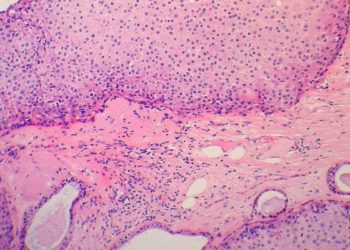The TNT trial: Intensive statin therapy in coronary heart disease [Classics Series]
1. In patients with stable coronary heart disease (CHD), high-dose atorvastatin significantly reduced the risk of major cardiovascular events when compared to low-dose.
2. Patients in the high-dose group experienced significantly higher rates of adverse events, though the rate of statin-related myalgias were similar in the two groups.
Original Date of Publication: April 2005
Study Rundown: Numerous studies exist to support the effectiveness of statins in secondary prevention of major cardiovascular events. At the time this study was conducted, guidelines recommended an LDL target of 2.6 mmol/L (100 mg/dL) in patients with stable coronary heart disease (CHD). Several smaller studies, however, suggested more aggressive LDL targets could provide clinical benefit. The Treating to New Targets (TNT) trial was conducted to gauge the safety and effectiveness of lowering LDL targets among patients with stable CHD.
In summary, this prospective, randomized controlled trial found that a higher dose of atorvastatin (80 mg daily compared to 10 mg daily) was associated with greater reductions in LDL. Patients in the high-dose group experienced a significant reduction in the rate of major cardiovascular events (death from CHD, nonfatal myocardial infarction, fatal/nonfatal stroke, resuscitation after cardiac arrest). There was no difference between the groups in all-cause mortality. The rate of adverse events was significantly higher in the high-dose group, though the rate of statin-related myalgias were similar in the two groups. This trial provided evidence to support higher doses of statin therapy in patients with stable CHD.
Click to read the study in NEJM
In-Depth [randomized controlled trial]: This prospective, double-blind, randomized trial was conducted at 256 institutions in 14 countries. Patients were eligible for the trial if they had a history of clinically evident CHD (previous myocardial infarction, previous or current angina, history of coronary revascularization) and were between 35 and 75 years of age. During the 8-week run-in, all patients received 10 mg of atorvastatin daily in an open-label fashion. At the end of this period, patients with LDL <3.4 mmol/L (130 mg/dL) underwent randomization. In total, 10 001 patients were randomized to either 10 mg daily (low-dose) or 80 mg daily (high-dose) of atorvastatin daily, and were followed for a median of 4.9 years. The primary outcome was the occurrence of a major cardiovascular event (death from CHD, nonfatal myocardial infarction, fatal/nonfatal stroke, resuscitation after cardiac arrest).
At randomization, the two cohorts had similar serum LDL levels. By 12 weeks after randomization, LDL levels were significantly higher in the low-dose group (101 mg/dL or 2.6 mmol/L vs. 77 mg/dL or 2.0 mmol/L) and this difference was maintained throughout the follow-up period. The rate of the primary outcome was significantly lower in the high-dose group, as compared with the low-dose group (8.7% vs. 10.9%; HR 0.78, 95%CI 0.69-0.89, p < 0.001). This was driven by significantly lower rates of nonfatal myocardial infarction (HR 0.78, 95%CI 0.66-0.93, p = 0.004) and fatal/nonfatal stroke (HR 0.75, 95%CI 0.59-0.96, p = 0.02). There was no difference between the groups in terms of all-cause mortality (p = 0.92). More adverse events were observed in the high-dose group (8.1% vs 5.8%, p < 0.001). There were similar rates of statin-related myalgias in both groups (p = 0.72), though the high-dose group had significantly more patients with persistently elevated aminotransferase levels (p < 0.001).
Image: PD
©2017 2 Minute Medicine, Inc. All rights reserved. No works may be reproduced without expressed written consent from 2 Minute Medicine, Inc. Inquire about licensing here. No article should be construed as medical advice and is not intended as such by the authors or by 2 Minute Medicine, Inc.







